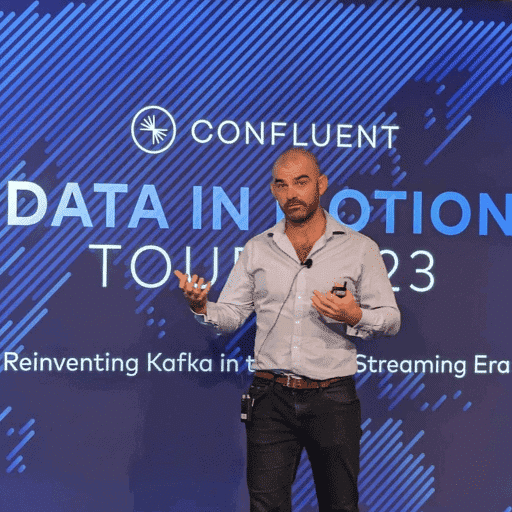As the digital world continues to dominate the banking industry, concerns about data security and privacy are coming to the forefront. As algorithms become more advanced, building a profile based on users data, and identifying abnormal transactions that could indicate fraudulent activity. This has led to concerns about privacy, as individuals feel like they are constantly being monitored.
The financial industry is constantly seeking to improve algorithms to better detect potential fraudulent activity.
Stuart Ward, Director of Financial Services from Confluent, discussed at the recent event, Data in Motion Tour in Sydney – the importance of identifying abnormal transactions to quickly prevent fraud.
“They [customers] need to be educated on what to look out for. But not only that, the financial service industry, like a payment, is how fraud actually gets executed. And so it’s on the industry to actually provide protection. And that’s what we’re focused here at Confluent, protecting customers and giving banks better capabilities to do that.”
Confluent’s data streaming technology can compare transactions to a user’s regular behavior and make an immediate determination. Several banks, including CapitalOne, Bank of Indonesia and Alex Bank, are using Confluent to prevent fraud and reduce potential losses.
In addition to fraud prevention, data streaming capabilities are also being used for marketing and insurance purposes. This presents a challenge for banks in determining where to draw the line between false negatives/false positives and creating a better customer experience.
Ward notes that the financial service industry is where fraud is executed, making it their responsibility to provide protection.
However, as fraudsters become more sophisticated, customers need to be able to identify scams and suspicious activity themselves to better protect themselves. Banks also need to be cautious when giving third parties access to customer data for marketing or other non-protection purposes.
Ward describes the criminal’s behaviour as the three P’s, persistent, patient, polymaths (they’re skilled in multiple domains).
“They’re polymaths. They’re skilled in multiple domains now. They’re not only skilled in financial services, but often they’re skilled in cyber. And so that brings us to how the industry needs to respond. You need to respond to those three areas as well. This means not only examining transactions for risk, but also their technical attributes like login location, device ID and similar to assess broader risk. When addressing the persistence and patience elements, it’s critical to continually examine transaction behaviours. With Wage staging, which is a common fraud technique used for loan fraud, wages will be fraudulently staged for up to 6 months, often then to be repaid after the loan is written. “
It’s noted that though it is often assumed that the elderly are the primary targets of fraudulent activities, younger people are also falling prey to these schemes according to the recent ACCC Report. Many fraudsters are pretending to be representatives of well-known banks and requesting that people move their money to random accounts.
In the UK, there is a liability model in place where banks are 100% liable for losses that impact their customers through scams. Refunding customers is one way to increase the level of protection. However, Ward believes that the industry needs to move from detection to prevention. He suggests introducing friction – such as two-factor authentication – when a transaction is attempted in a location different from the usual location of the payer or in an unreasonable time frame. Refunding customers increases the level of protection, but also leads to higher costs for the banks. Ultimately, the key is to prevent fraudulent transactions from occurring in the first place, by using advanced algorithms to detect abnormalities and introducing friction to confirm suspicious transactions.
Though this may be inconvenient for some, it can stop many fraudulent transactions before they occur. As fraudsters become more sophisticated, customers need to be identified through profiles to ensure protection. Banks must also be cautious when giving third parties access to customer data for marketing or other non-protection purposes. The financial industry needs to respond by focusing on three areas: financial services, cyber, and customer awareness. Professionals in the field must now be polymaths, meaning they are skilled in multiple domains including cyber. The industry must also enable customers to notice scams and suspicious activity to better protect themselves.
“That goes back to the persistence of the three P’s. And it’s about every time you see a transaction algorithmically making determination whether that’s normal for you or that’s abnormal, there’ll be cases where it’s normal. And I guess that’s some of the ongoing challenge for banks actually, is to draw the line. Where do they draw the line between false negatives or false positives and create a good customer experience.”
The financial service industry needs to keep up their efforts to prevent fraudulent activity as digital systems become more sophisticated. Customer data must be protected, while also being utilised to prevent fraudulent activity and aid in marketing and insurance. While inconvenience may be perceived for some customers, implementing additional security measures can help to prevent scams before they occur. By working on financial services, cyber, and customer awareness, banks could dramatically reduce the prevalence of fraudulent activity in the industry.
Overall, the financial industry needs to focus on ensuring the integrity of their customer data while advancing their fraud prevention measures. The implementation of new technologies will be crucial in continuing to provide customers with safe banking experiences and ultimately reduce the risk of fraudulent activity.






